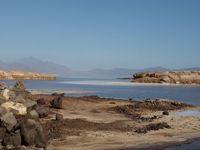Visit worldtravels.com for the full guide to Djibouti. Build a complete Djibouti travel guide and email to your clients - sign up for a trial subscription of World Travels Pro.
Djibouti

Djibouti is a tiny, arid and easily overlooked country seated on the rim of Africa's horn - an unpopular (though often frequented) pit-stop for vessels passing in and out of the Red Sea, but not much ventured into by tourists. This is unfortunate because Djibouti has some rare qualities that abundantly reward the intrepid visitor.
Large parts of the country's interior sit within the Afar Depression, a region lying 500 feet (155m) below sea level that is rich in ancient fossils and one of the hottest places on Earth, with temperatures reaching 118°F (48°C). Lake Assal, 75 miles (120km) south of Djibouti City, is the lowest point in Africa and the water steams at an unswimmable 34°C. The pressure underneath fissures around the lake cause fantastic plumes of steam to hiss out of the surrounding plateau.
Most of the country is desert with no arable land, crops, irrigation or forestland. The interior is mountainous in the centre, filtering down to the coastal plain on the east and the arid plateau in the west. Any ventures into the interior have to be conducted in a 4x4. If you want to get out of Djibouti City but not travel too far, the beaches at Doralé and Khor-Ambado provide warm waters to swim in and exotic marine life to dive with. Two thirds of the 700,000 strong population live in the capital of Djibouti City, while the rest live just as residents of the country have for centuries - as nomadic herders.
There is no industry in the city, and thus in the country, but a large informal market economy thrives. For visitors looking to spend a few hours in the city, the Central Market, the Stade du Ville (national stadium), Presidential Palace and Hamouli Mosque are all worthwhile stops. But getting around is not cheap, the lack of infrastructure and regulation means that a taxi may overcharge heavily for a ride. Unlike her neighbours Ethiopia and Eritrea, Djibouti enjoys political stability and a relatively safe atmosphere.
Passport Visa
Nationals of any country can obtain a visa on arrival in Djibouti (valid for a maximum stay of one month), provided they are holding: (i) return or onward tickets; (ii) required entry documentation for their next destination; (iii) sufficient funds to cover their stay in Djibouti or a voucher if travelling in an organised tour. The visa fee is DJF 10,000. NOTE: It is highly recommended that your passport has at least six months validity remaining after your intended date of departure from your travel destination. Immigration officials often apply different rules to those stated by travel agents and official sources.
Entry Requirements
- US citizens require a passport valid upon arrival in Djibouti, and can obtain a visa on arrival for up to one month.
- British citizens require a passport valid upon arrival in Djibouti, and can obtain a visa on arrival for up to one month.
- Canadian citizens require a passport valid upon arrival in Djibouti, and can obtain a visa on arrival for up to one month.
- Australian citizens require a passport valid upon arrival in Djibouti, and can obtain a visa on arrival for up to one month.
- South African citizens require a passport valid upon arrival in Djibouti, and can obtain a visa on arrival for up to one month.
- Irish citizens require a passport valid upon arrival in Djibouti, and can obtain a visa on arrival for up to one month.
- New Zealand citizens require a passport valid upon arrival in Djibouti, and can obtain a visa on arrival for up to one month.







